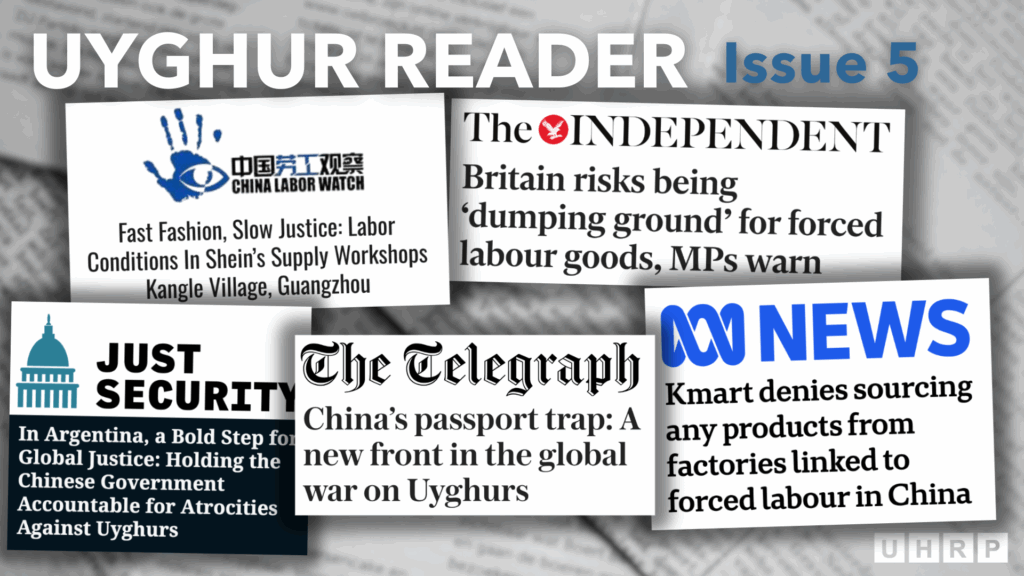The Uyghur Reader: Stories We’re Following (Issue 5)

Issue 5: July 24 – August 6, 2025
Welcome to the fifth issue of The Uyghur Reader, a biweekly content roundup curated by the staff of the Uyghur Human Rights Project.
Each issue features carefully selected articles, reports, and publications from media outlets, academic institutions, NGOs, and government sources. While we highlight urgent human rights issues, we also aim to reflect the breadth of the Uyghur experience, including politics, economics, history, and culture. Our goal is to provide a trusted resource for understanding the complexities and realities facing Uyghurs today.
This week’s selections come from Director of Research Henryk Szadziewski, Associate Director for Research and Advocacy Peter Irwin, and Chinese Outreach Coordinator Zubayra Shamseden.
📌 China is using fraudulent passports as a new tactic to force Uyghurs abroad into returning to the PRC, where they risk arbitrary detention, torture, and forced labor, writes Sophia Yan in The Telegraph. Obulqasim Isma’il, a long-time resident of Kyrgyzstan, was issued a passport with falsified details by the Chinese embassy, an act that now places him at risk of imminent deportation. His case highlights the evolving methods of China’s transnational repression, targeting even apolitical Uyghurs simply for their identity. China’s passport trap: A new front in the global war on Uyghurs, August 5.
📌 The Australian Uyghur Tangritagh Women’s Association, represented by the Human Rights Law Centre, has launched legal action against Kmart, seeking to determine whether the company misled consumers about the use of Uyghur forced labour in its supply chains. The case, brought under Australian consumer law, follows Kmart’s refusal to disclose audit results related to suppliers potentially linked to human rights abuses in East Turkistan. Coverage of the legal action: Bronwyn Herbert and Lucy Kent (ABC) and James Harrison (Sky News), August 5.
📌 Rayhan Asat and Sophie Richardson explain that the decision by Argentina’s highest criminal court to proceed with a legal case brought by Uyghur plaintiffs, including UHRP, against Chinese officials, accusing them of crimes against humanity, offers a rare legal recourse and a refocusing of global attention on the Uyghur genocide. “In Argentina, a Step to Hold China Accountable in Uyghur Atrocities,” July 31, Just Security.
📌 The Rights Practice released “When the State Makes You Work,” in July, a comprehensive report exposing the political use of state-imposed forced labour in China, particularly targeting Uyghurs and others in detention. The report details how such practices violate international labour standards and may constitute crimes against humanity under international law. The authors write, “We prepared this report to help inform decision-making and due diligence within policy and business communities regarding the use of forced labour in China. Our aim is to provide greater contextual detail than is generally found in the many sector-specific investigations into the risks of forced labour from China.”
📌 Based on over 50 worker interviews, several site visits, and detailed research from 2019 to 2025, China Labor Watch (CLW) investigates Shein’s supplier factories in Guangzhou, China. It highlights serious concerns related to labor conditions, child welfare, workplace safety, and potential violations of migrant and gender rights. These issues are compounded by broader systemic factors and recent economic shifts, such as changes in U.S. tariff policies, which have worsened worker vulnerabilities. Additionally, open-source evidence suggests a credible risk that some Shein products sold outside the U.S. may contain textiles from East Turkistan. The report concludes by urging greater supply chain transparency, fair trade practices, systemic reforms, and stronger regulatory action. Fast Fashion, Slow Justice, July 30.
📌 Nazima Tursun, writing for the Atlantic Council, urges the United States to use economic statecraft, particularly trade enforcement and financial tools, to confront and dismantle the Chinese government’s system of forced labor targeting Uyghurs and other Turkic peoples. Nazima adds that by rigorously enforcing the Uyghur Forced Labor Prevention Act and coordinating with allies, Washington can help sever global supply chains from complicity in rights abuses and uphold international labor and human rights standards. Safeguarding Uyghur human rights: The US should leverage economic statecraft tools to end Uyghur forced labor, July 29.
📌 In “Britain risks being ‘dumping ground’ for forced labour goods, MPs warn,” Stéffie Banatvala, The Independent, July 23, explains how a new report from the UK parliament’s Joint Committee on Human Rights (JHCR) cautions that Britain’s weak enforcement against forced labour risks enabling the import of goods produced through the exploitation of Uyghurs in China. The report criticizes the UK’s failure to match U.S. and EU bans on products linked to forced labour, urging stronger laws to prevent complicity in rights abuses. Read the JCHR report.
Keep reading:
- NetAskari, Substack, July 25: Xinjiang Police College: Training the “Cyber police”
- Nathan Strout, Seafood Source, August 4: US lawmakers want to root out any Chinese seafood from the military over Uyghur labor
- Jonathan Touriño Jacobo, PV Tech, August 6: Warning of renewed forced-labour enforcement in US after Hanwha cells reportedly detained
- Jeff Merkley, Senator for Oregon, July 29: Merkley, Cornyn Unveil Bipartisan Bill to Defend Vulnerable Uyghurs from Being Forcibly Returned to PRC
- Congressional-Executive Commission on China, July 31: Chairs Introduce Landmark Uyghur Genocide and Sanctions Accountability Act
- Vijiesti, July 28: Witness to Uyghur camps in China dies in Sarajevo, body in morgue for two months
- The Cambridge Student, July 4: Transnational Repression: Collaboration with Chinese Characteristics
